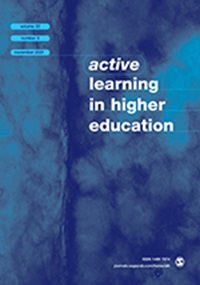Collaborative learning as constructivist practice: An exploratory qualitative descriptive study of faculty approaches to student group work
IF 3.8
1区 教育学
Q1 EDUCATION & EDUCATIONAL RESEARCH
引用次数: 0
Abstract
Collaborative learning is a common teaching technique, posited to align with a constructivist approach to teaching and learning. This qualitative descriptive study explores how, if at all, faculty implementation and discussion of collaborative learning shows evidence of it as a constructivist practice. Nineteen faculty at a large public mid-Atlantic university in the United States, representing a variety of academic disciplines, were interviewed about the ways in which they use collaborative learning in their courses. Driscoll’s five constructivist conditions for learning guided qualitative analysis: complex and relevant learning environments, social negotiation, multiple perspectives and modes of learning, ownership in learning, and self-awareness of knowledge construction. Faculty descriptions of collaborative learning provided a rich picture of its use and revealed ample alignment with these conditions. Faculty most often highlighted the ways in which collaborative learning supported the creation of complex and relevant learning environments and allowed for students’ ownership in learning. They least often discussed the ways in which collaborative learning supported self-awareness of knowledge construction and occasionally expressed challenges with social negotiation.作为建构主义实践的合作学习:教师学生小组工作方法的探索性定性描述性研究
合作学习是一种常见的教学技术,被认为与建构主义的教学方法相一致。这项定性描述性研究探讨了教师对合作学习的实施和讨论(如果有的话)如何证明它是一种建构主义实践。美国大西洋中部一所大型公立大学的19名教员代表了各种学术学科,他们接受了采访,了解他们在课程中使用协作学习的方式。Driscoll的五个建构主义学习条件引导了定性分析:复杂和相关的学习环境、社会协商、多种学习视角和模式、学习所有权和知识建构的自我意识。教员对协作学习的描述提供了其使用的丰富画面,并揭示了与这些条件的充分一致。教员们经常强调协作学习支持创建复杂和相关的学习环境,并允许学生自主学习的方式。他们很少讨论协作学习支持知识建构自我意识的方式,偶尔也会表达对社会协商的挑战。
本文章由计算机程序翻译,如有差异,请以英文原文为准。
求助全文
约1分钟内获得全文
求助全文
来源期刊

Active Learning in Higher Education
EDUCATION & EDUCATIONAL RESEARCH-
CiteScore
13.20
自引率
12.00%
发文量
31
期刊介绍:
Active Learning in Higher Education is an international, refereed publication for all those who teach and support learning in higher education (HE) and those who undertake or use research into effective learning, teaching and assessment in universities and colleges. The journal is devoted to publishing accounts of research covering all aspects of learning and teaching concerning adults in higher education. Non-discipline specific and non-context/country specific in nature, it comprises accounts of research across all areas of the curriculum; accounts which are relevant to faculty and others involved in learning and teaching in all disciplines, in all countries.
 求助内容:
求助内容: 应助结果提醒方式:
应助结果提醒方式:


